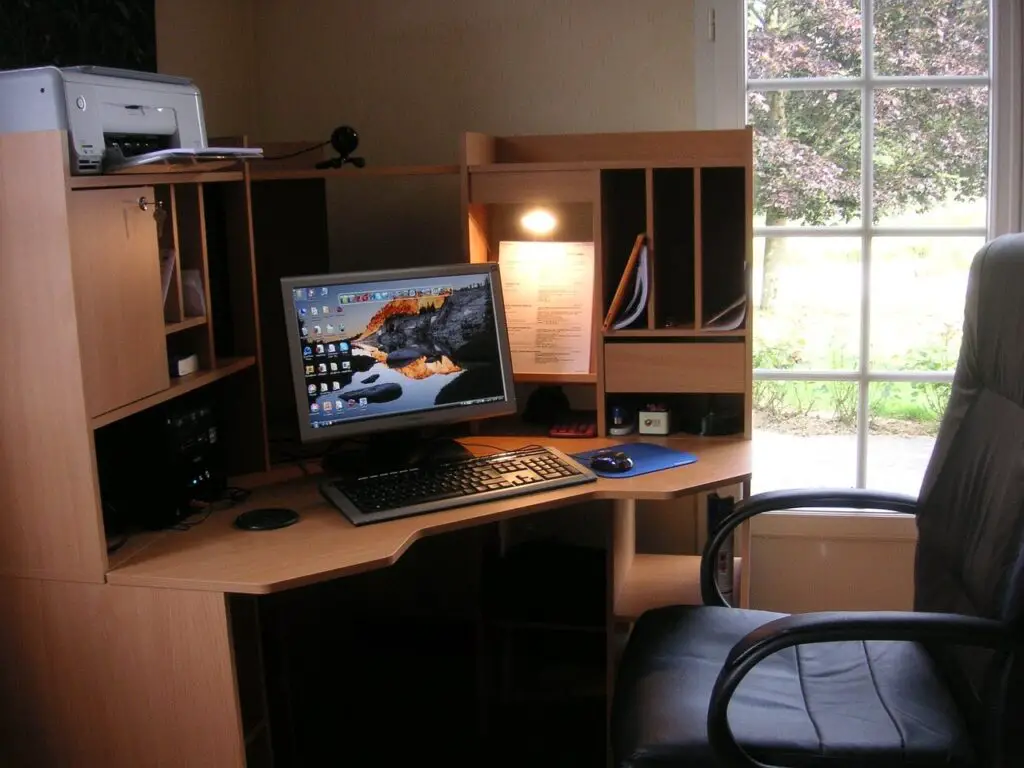If your neighbour is running a business from home in the UK that is creating a nuisance, maybe you are wondering if you can do anything. If so carry on reading…
In recent years, we’ve witnessed a remarkable rise in the number of individuals embracing the entrepreneurial spirit by establishing home-based businesses. While this trend brings exciting opportunities and benefits to budding entrepreneurs, it also presents challenges for their neighbours.
As a responsible and considerate neighbour, it’s crucial to understand the legal and practical aspects surrounding this situation. By delving into this topic, I aim to shed light on how you can navigate these scenarios.
Running a business from the comfort of one’s own home offers remarkable flexibility and cost-saving advantages. From online retail stores to freelance services and creative endeavours, there’s a myriad of home-based businesses sprouting up in residential areas across the UK.
However, it’s essential to recognise that such ventures may inadvertently impact the surrounding community, including neighbours like yourself.
In this blog, I’ll explore the intricacies of home-based businesses in the UK, including the types of businesses commonly found, the benefits they bring, and the challenges they may pose to neighbours.
I will delve into the legal considerations, such as permitted business activities and licensing requirements, ensuring you are well informed about your rights and obligations.
Moreover, we’ll explore practical solutions to common concerns, such as noise, parking, and increased foot traffic. By fostering open communication and understanding, we can strive for peaceful coexistence in our neighbourhoods.
So, whether your neighbour is running a business from home or you are simply seeking knowledge for future reference, I hope this UK guide helps.

Understanding Home-Based Businesses in the UK
Home-based businesses come in all shapes and sizes, catering to a diverse range of industries and interests.
Let’s take a closer look at some common types of home-based businesses you might encounter in the UK:
- Online Retail: Online retail businesses have gained immense popularity, with entrepreneurs selling products through e-commerce platforms. Think of the neighbourhood boutique owner curating a stunning collection of clothes or the craft enthusiast crafting handmade jewellery to be sold online.
- Freelance Services: Talented individuals often turn their skills and expertise into thriving freelance businesses. This can include graphic designers, writers, web developers, photographers, consultants, and more. These professionals serve clients remotely, providing valuable services from the comfort of their home offices.
- Creative Endeavours: Artists, writers, musicians, and other creative souls often find their home to be the perfect sanctuary for inspiration. From painters creating masterpieces in their studios to writers crafting captivating novels from their cosy writing nooks, the arts find solace within the walls of a home.
- Personal Care and Wellness: Many professionals in the personal care and wellness industry opt for home-based businesses. You might encounter beauty therapists offering treatments, yoga instructors hosting sessions, or personal trainers guiding workouts—all from the comfort of their own homes.
These examples represent just a fraction of the diverse array of home-based businesses found across the UK.
From technology-driven enterprises to artisanal crafts and everything in between, the possibilities are truly endless.
Benefits and Challenges of Home-Based Businesses
Now that we’ve explored the different types of home-based businesses in the UK, let’s delve into the advantages and challenges that arise from running a business from the comfort of one’s home.
By understanding these dynamics, you can gain a deeper appreciation for the impact it may have on both the business owner and their neighbours.
Advantages of Running a Business from Home:
Flexibility: One of the most significant advantages of home-based businesses is the flexibility they offer. Entrepreneurs can set their own working hours, allowing them to strike a healthy work-life balance. This flexibility is especially valuable for those juggling family responsibilities or other commitments.
Reduced Overhead Costs: Running a business from home can significantly reduce overhead costs. Without the need for separate office space, business owners can save on rent, utilities, and commuting expenses. This cost-effective approach allows them to allocate resources more efficiently, ultimately benefiting both the business and its customers.
Convenience and Comfort: Working from home provides a comfortable and familiar environment that promotes productivity and creativity. The absence of daily commuting contributes to less stress and more time for focusing on business growth and customer satisfaction.
Potential Issues If A Neighbour Is Running A Business From Home UK:
- Noise Complaints: Neighbours may experience disturbances due to excessive noise generated by the business operations. They can contact their local council’s Environmental Health Department to report the issue. The council can investigate the noise levels and enforce any necessary noise abatement measures.
- Parking Problems: Increased parking demand from clients or employees of the home-based business can lead to parking congestion in the neighbourhood. Neighbours can contact their local council to address the issue. The council can provide guidance on parking restrictions, permit schemes, or consider alternative parking solutions in the area.
- Increased Foot Traffic: If the business results in a significant increase in foot traffic, causing congestion or safety concerns in the neighbourhood, neighbours can reach out to their local council’s Planning or Licensing Department. The council can assess whether the business is operating within permitted limits and take appropriate action if necessary.
- Odour or Environmental Concerns: Certain types of home-based businesses, such as food preparation or manufacturing, may emit odours or pose environmental risks. Neighbours can contact their local council’s Environmental Health Department to report any concerns. The council can conduct investigations, ensure compliance with regulations, and take necessary measures to address the issues.
- Structural or Property Damage: Intense business activities may result in structural damage to neighbouring properties or cause other property-related issues. In such cases, neighbours should consult with a professional, such as a qualified surveyor or building inspector, to assess the damage and recommend necessary repairs. They can also seek legal advice from a solicitor specialising in property law to explore potential remedies and liabilities.
It’s important to note that while these examples provide a general framework for addressing common issues, the specific process and authorities involved may vary depending on the local council and the nature of the business.
Neighbours should always consult the appropriate local authorities or seek legal advice for their specific situation.
The following might be of interest:
- Contact Environmental Health About Neighbours: Act Now
- The Dos And Don’ts Of Involving The Police In A Neighbour Dispute
- When To Get A Neighbour Dispute Solicitor Involved?
- How To Complain About A Neighbour To The Council?

Legal Considerations for Home-Based Businesses
Permitted Business Activities in Residential Areas
Let’s now explore the crucial legal considerations for home-based businesses in the UK.
Local councils impose regulations and restrictions to maintain the harmony of residential areas while accommodating the growing trend of home-based businesses.
Each council may have its own specific guidelines, but generally, the following factors are taken into account when determining whether a particular business can operate from a residential property:
- Nature of the Business: Certain businesses may be inherently incompatible with a residential environment due to their scale, noise levels, or impact on the neighbourhood. Local councils consider whether the business is likely to cause a disturbance or compromise the peaceful enjoyment of nearby residents.
- Proportion of the Property Used for Business: The extent to which a residential property is utilised for business purposes is also evaluated. Councils typically set limits on the proportion of the property that can be used for the business, ensuring a fair balance between residential and commercial activities.
- Impact on the Community: The potential impact on the surrounding community, including issues like parking, traffic, waste disposal, and visual aesthetics, is also taken into consideration. Maintaining the overall well-being and character of the neighbourhood is a key concern for local authorities.
Home-based business owners need to familiarise themselves with their specific council’s regulations to ensure compliance and avoid any potential conflicts with neighbours.
Consulting with legal professionals experienced in local regulations can provide valuable guidance tailored to your situation.
Licensing and Permissions
Home-based business owners may be required to obtain certain licenses and permissions, depending on the nature of their activities. The licensing and permission requirements can vary depending on the business type and location.
Common licenses and permissions include:
- Planning Permission: In some cases, obtaining planning permission may be necessary, especially if significant alterations to the property are planned or if the business falls under specific categories outlined by the council.
- Environmental Health and Safety Permits: Certain home-based businesses, such as those involving food preparation or beauty treatments, may require environmental health and safety permits to ensure compliance with hygiene standards and safeguard public health.
- Trade-Specific Licenses: Certain industries have trade-specific licensing requirements. For example, if you’re operating a taxi service or a childminding business, you may need to acquire licenses or certifications specific to those fields.
- Permission from Mortgage Provider: In some cases, you may need permission from your mortgage provider to run a business from home.
- Permission from Landlord: If you are renting and intend to run a business from home, then you should get permission from your landlord. The tenancy agreement might specify that you can’t run a business from the property. If you live in a council house, then you will need to get express permission to run the business from home.
- Restrictive Covenants: You will need to check your property deeds to ensure there are not any restrictive covenants that prevent you from running a business from home.
- Insurance: Depending on the business specific insurance might be required, especially if employees or the general public enter the house.
The process of obtaining licenses and permissions can vary, involving application forms, documentation, and potential inspections by relevant authorities.
If your neighbour is running a business from home in the UK, they may also need specific insurance and potentially pay business rates.
Seeking professional legal advice can help ensure you understand and fulfil all necessary requirements.
If you believe your neighbour is running a business from home illegally or is causing a nuisance then you should contact your local council for advice or to make a complaint.

Compliance with Health and Safety Regulations
Home-based businesses must comply with health and safety regulations to protect both the business owner and their neighbours.
This includes taking necessary precautions to mitigate potential risks and hazards.
Common obligations include:
- Risk Assessments: Conducting regular risk assessments to identify potential hazards and implementing measures to eliminate or minimise those risks.
- Fire Safety: Ensuring adequate fire safety measures are in place, including appropriate fire detection systems, emergency exits, and fire extinguishers.
- Hygiene and Sanitation: Maintaining proper hygiene practices, especially for businesses involved in food preparation, beauty treatments, or pet care.
Compliance with health and safety regulations not only demonstrates a commitment to professionalism and responsible business practices but also helps prevent any issues that may arise with neighbours or local authorities.
By understanding and adhering to the legal considerations surrounding home-based businesses, you can ensure a smooth operation while maintaining positive relationships with your neighbours.
Addressing Common Concerns with Neighbours
Open Communication
Maintaining open lines of communication with your neighbour who is running a home-based business is essential for fostering a harmonious neighbourhood environment.
Here are some tips for initiating a conversation and expressing concerns politely:
- Choose the Right Time and Approach: Find a suitable moment to have a conversation with your neighbour. Approach them in a friendly manner, expressing your appreciation for their business and acknowledging the value they bring to the community.
- Be Respectful and Non-Confrontational: Clearly communicate your concerns while remaining respectful and understanding. Avoid accusatory language or a confrontational tone, as it can hinder productive dialogue. Remember, the goal is to find mutually beneficial solutions.
- Seek Common Ground: Look for areas of common interest or shared concerns. Emphasise your desire for a peaceful and cooperative neighbourhood and explore possible compromises that can address the concerns while supporting the success of their business.
Mitigating Noise and Disturbance
Noise and disturbance are common concerns when a business operates from a residential property.
Fortunately, there are practical solutions that can help minimise these issues and maintain a peaceful environment for all.
Consider the following suggestions:
- Soundproofing: Encourage your neighbour to explore soundproofing options, such as adding insulation or using acoustic materials, to reduce noise transmission. This can significantly mitigate the impact of business activities on neighbouring properties.
- Designated Working Hours: Discuss the possibility of establishing designated working hours that align with the needs of the neighbourhood. Agreeing on specific timeframes when noise-intensive activities can take place can help strike a balance between business operations and the tranquillity of the area.
- Relocating Certain Activities: If certain business activities generate excessive noise or disturbance, explore the feasibility of relocating them to a more suitable area within the property. Shifting noisy equipment or client meetings away from shared walls can help minimise the impact on neighbours.
Managing Parking and Traffic
If your neighbour is running a business from home then you might have parking and traffic-related issues if it attracts an increased number of visitors or employees.
Proactively managing these concerns can contribute to a smoother coexistence within the neighbourhood. Consider the following strategies:
- Alternative Parking Solutions: Encourage your neighbour to explore alternative parking arrangements, such as utilising nearby public parking areas or renting additional parking spaces if available. This can help alleviate parking congestion in the immediate residential vicinity.
- Carpooling and Remote Working: If feasible, discuss the possibility of implementing carpooling initiatives or encouraging employees to work remotely. These measures can help reduce the number of vehicles in the area, easing parking and traffic concerns.
- Collaborative Solutions: Engage in a community-wide discussion to identify innovative parking and traffic management solutions. Collaborative efforts, such as implementing parking permits or establishing shared parking agreements, can create a more organised and efficient parking system.
By approaching common concerns with open communication and practical solutions, both you and your neighbour can work together to address any issues that may arise from their home-based business.
Report Neighbour Running a Business From Home UK
In some instances, despite open communication and attempts to find solutions, concerns related to a neighbour’s home-based business may persist.
If your neighbour is causing a nuisance by running their business from home, then in the UK you can make a complaint to your local council.
The process to report a neighbour running a business from home in the UK typically involves the following steps:
Step 1 – Gather Evidence
Before reporting any concerns, it’s important to gather evidence to support your claims. Document instances of excessive noise, parking violations, or any other issues that are causing disruption or inconvenience.
Also do some research to see if they have the relevant permissions to run a business from home.
I would highly recommend getting a smart doorbell or home security, such as a Ring Doorbell or Eufy home security system, so you can record the issues and disturbances. It’s much easier than having to put your evidence in words.
I have an article on gathering evidence for a neighbour dispute that you can read here.
Step 2 – Contact the Local Council
Reach out to the local council responsible for regulating businesses and residential areas in your locality.
Provide them with a clear and concise description of the concerns, including relevant evidence and specific details about the neighbour’s business activities.
Step 3 – Follow the Council’s Guidelines
Local councils often have specific procedures in place for handling complaints regarding home-based businesses.
Follow their guidelines regarding the submission of complaints, required documentation, and any additional information they may require.
The council will have to consider all of the information but if after their investigations they can see that the property is not used mainly as a residential property and this is causing a nuisance to neighbours such as smells, noises or increased people coming to the house, then these are reasonable grounds for them to take action.
If your neighbour is just running an online business from a spare room, then it is unlikely that the council will be able to take any action.
Local authorities should take complaints seriously and aim to address them in a fair and impartial manner.
They will typically investigate the reported concerns and assess whether the neighbour’s business activities comply with local regulations and the conditions of their permissions. You will be informed of the outcome.

Mediation and Conflict Resolution
In situations where communication alone does not resolve conflicts, seeking mediation or professional assistance can help facilitate a resolution in a neutral and impartial manner.
Mediation offers a structured approach to resolving disputes and can be an effective alternative to legal action.
Consider the following options:
Mediation Services:
Mediation involves bringing in a neutral third party, a mediator, to facilitate discussions between you and your neighbour. The mediator helps to identify common interests, explore possible compromises, and find mutually acceptable solutions.
You can get free and quick quotes for mediators or solicitors from Bark.com. I have personally used Bark.com and highly rate it.
Professional Legal Advice:
If conflicts persist or escalate, it may be necessary to seek professional legal advice. A solicitor experienced in property law and dispute resolution can offer guidance tailored to your specific situation.
They can provide legal insights, assess the strength of your case, and explore potential legal remedies.
Remember, seeking assistance from local authorities or pursuing mediation does not guarantee a specific outcome, but it can provide a structured process for resolving conflicts and achieving a fair resolution.
In conclusion, when concerns related to a neighbour’s home-based business persist, reporting the issues to the local council and exploring mediation or professional assistance can be helpful steps in finding a resolution.
The GOV.UK website has some further information about running a business from home in the UK that might be helpful.
Final Thoughts If A Neighbour Is Running A Business From Home UK
Throughout this blog, I have explored what to consider if a neighbour is running a business from home in the UK and the various considerations that arise from such situations.
In conclusion, it is essential to promote open communication and understanding between neighbours involved in home-based businesses.
By talking to your neighbours and finding compromises I hope that you and your neighbour will be able to work together.
Individuals must be aware of their rights and responsibilities when dealing with a neighbour running a business from home. If your neighbour’s business is creating a nuisance and you can’t resolve the issue directly with your neighbour then you should contact the council.
If the council do not resolve the issue you could consider mediation or seeking legal advice from a solicitor.
Understanding local regulations, obtaining necessary permits, and ensuring compliance with health and safety requirements are key to avoiding conflicts and maintaining a positive neighbourhood atmosphere.





Leave a Reply